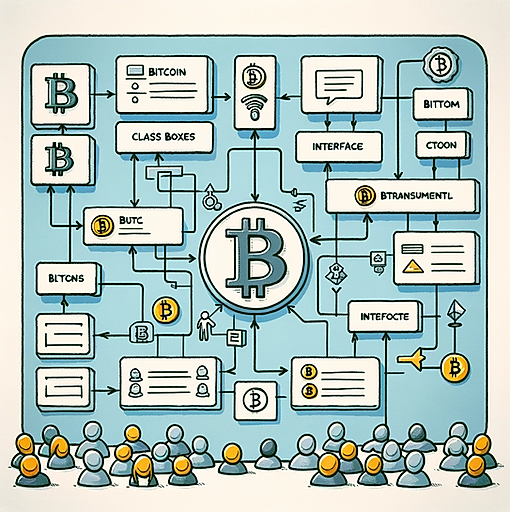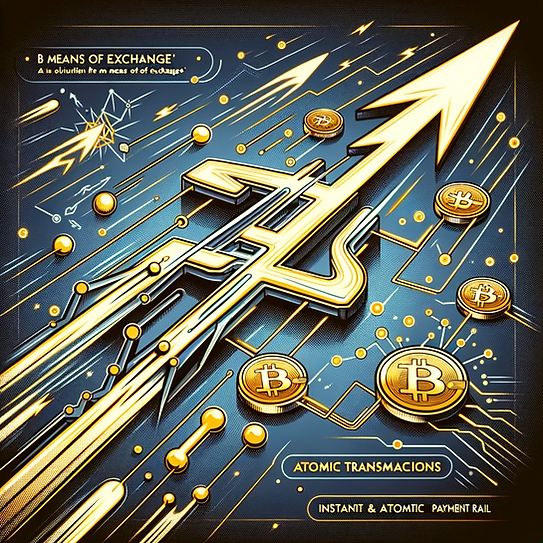Solutions
Introduction to Bitcoin
Both a protocol and an exchange network, Bitcoin is an unidentified object in the financial landscape. Still poorly understood, its main innovation lies in the creation of unparalleled trust, thanks to distributed consensus and continuous verification.
It's a super-predator compared to traditional assets, because not only is it more efficient in use cases as a store of value and medium of exchange, but it also disrupts the landscape of intermediaries.
Discover Bitcoin, how it is a boosting and diversifying asset for your business and your treasury, and how you can harness it today.
A protocol for peer-to-peer electronic cash
Bitcoin is an open protocol, just like HTTP or TCP/IP for the internet.
It is the first protocol for native electronic cash on the internet: it operates peer-to-peer between users and is completely distributed (without any third party).
Bitcoin is a form of electronic currency because it fulfills the following properties:
-
Unit of account
-
Means of exchange (peer-to-peer)
-
Portable (simply text and data)
-
Limited quantity (only 21 million Bitcoins will ever be issued)
-
Secure (no need for a trusted third party)
-
Neutral (uncensorable, non-confiscatable)
-
Open (permissionless)
-
Infinitely divisible
-
Fungible (homogeneity of "tokens")
-
Difficult to produce

Bitcoin is the first digital currency native to the internet

The first global digital monetary network
The ongoing adoption of this protocol by users has led to the creation of the first distributed monetary network on the internet. Anyone can freely run a network node to continuously audit it, or simply just transact.
The transaction ledger is completely distributed (blockchain) and its integrity is guaranteed through a unique consensus mechanism. The security is maximized and does not require a trusted third party.
-
A distributed ledger (register)
-
An audit every 10 minutes
-
A network composed of tens of thousands of validation nodes
-
A network secured by the world's greatest computing power (several times the combined capabilities of the GAFAMs)
-
The finality of transactions
Today it is the best secure and decentralised digital monetary network
The key innovations
The consensus mechanism without a centralized third party is THE true innovation of the Bitcoin protocol.
It solves the problem of double spending (a practical solution to the so-called "Byzantine Generals Problem").
It creates "digital scarcity," something previously considered impossible. No one can "copy/paste a Bitcoin" and spend it on your behalf.
-
Bitcoin is like a clock since new blocks of transactions appear approximately every 10 minutes. It forms a "time chain" with immutable entries.
-
Bitcoin allows anyone to be their own bank.
-
Bitcoin separates currency from traditional institutions.
-
Through a wall of energy and constant verification, Bitcoin is the space where the highest trust ever created by man resides.
Bitcoin is the "hardest" currency ever invented by humans.
-
Bitcoin has a strict monetary issuance: there will never be more than 21 million, of which 19 million have already been issued. This property is an integral part of the protocol ("code is law").
-
There is no possible depreciation due to monetary printing (unlike traditional currencies like the euro, whose 2% inflation target signifies a significant loss of purchasing power over its 20 years of existence).
-
The audit conducted every 10 minutes makes it completely verifiable (unlike, for example, the stock of gold).

Bitcoin introduces the concept of "digital scarcity," surpassing other currencies in this aspect.

Measuring how far it has come
Bitcoin emerges as a peaceful and complementary contender to current monetary solutions.
-
Age: 16 years (since January 3, 2009)
-
Daily Traded Value: $10 billion (> CAC40)
-
Market Cap: $800 billion (> LVMH, Visa, Meta; < Apple, Google)
-
Users: ~100 million (1% of the global population)
-
Volatility: intrinsically none (1 Bitcoin = 1 Bitcoin), but very high externally (when exchanged in fiat currency)
-
Value in fiat currency during the first transaction: $0.0009, today: $42,000 (increased by 46 million times)
-
Declared dead or disparaged by competitors: once a month
Bitcoin is a marvel of human cooperation:
-
Completely open source
-
Legal entity: none
-
CEO: none
-
Venture Capital: none
-
Marketing: none
-
R&D Costs: none
-
Governance: by users
-
Innovative economic model: block creation subsidized by transaction fees (auctions)
-
Uptime: operational 100% since 2013
-
Security: never compromised
Bitcoin is a marvel of human cooperation
Use case #1: Store-of-value
Unlike other currencies, Bitcoin does not suffer from:
-
Depreciation through monetary printing. Without an inflationary policy, its issuance is strictly controlled.
-
Depreciation through credit. Unlike traditional "debt currencies," where private banks can create money "ex nihilo" on a computer.
-
Counterparty risk. Unlike traditional currencies operated by banks that practice "fractional reserves" (the banks do not have all depositors' money available at all times).
he trust in its consensus mechanism, its robustness, security, and universality make Bitcoin a highly effective asset as a store of value.
-
It is easily transportable across space (a spending "key" consists only of a few dictionary words).
-
It is "accessible" 24x7, without the need for third-party authorization and without transaction limits.
-
It is transportable through time due to the immutability of the ledger, ensured by consensus.
-
By nature deflationary, this digital asset's value tends to grow over time.
-
Each new block issued reinforces trust.
-
Each new user acquired increases the "network effect."

Bitcoin meets the need to save: transporting the fruits of one's labor across space and time. It's a treasury tool.
Use case #2: Mean-of-exchange

Bitcoin is a universal monetary network native to the internet, accessible to everyone for transactions.
-
Transactions are secure.
-
Transactions are final (without intermediaries and no possibility of chargebacks).
-
There are no upper or lower limits on transaction amounts.
-
Transactions are possible 24x7.
-
Transaction fees vary (e.g., a few euros in early 2024).
F
urthermore, anchored on the trust of the Bitcoin network, there is an open protocol, the Lightning Network, which enables instantaneous value exchange at the speed of light and with very low fees. It is akin to the email protocol applied to payments. This greatly expands Bitcoin's capabilities and offers a multitude of use cases for businesses.
To dig deeper:
Bitcoin and the Lightning Network represent next-generation "medium of exchange" solutions, offering superior efficiency.
The disruption through disintermediation
While Bitcoin's innovation is unique and comparable to other major human advancements, its most easily perceivable effect is a well-known phenomenon: disruption through disintermediation.
However, this disintermediation means that users must take responsibility for their own security. In the absence of customer service, a mistake can lead to irreversible loss of funds. Nevertheless, products and solutions are constantly improving. Ultimately, this represents a new form of freedom: akin to learning to navigate a city on one's own, users gradually acquire the skills needed to navigate and protect themselves in this environment.
Bitcoin, the #1 ESG asset
Contrary to outdated perceptions, Bitcoin is now recognized as an ESG (Environmental, Social, and Governance) asset.
Social:
-
It enables people without access to traditional banking services to participate in the economy, including 15 million Americans, 13 million Europeans, and 1.7 billion people worldwide. As money is a common good and the foundation of civilization, this is Bitcoin's least known yet most important mission.
-
Bitcoin provides solutions for refugees, cross-border remittances (diasporas), dissidents and so on
-
Bitcoin's pseudonymous nature makes it more traceable compared to traditional banking networks where the percentage of "illicit" transactions is reportedly 10 to 20 times higher.
Governance:
-
Bitcoin's governance is a model of efficiency and resilience. Due to its distributed nature, users have the final say on the majority version of the code running on network nodes, ensuring the stability of the consensus mechanism.
-
The protocol has proven robust against internal divergences (e.g., "blocksize wars").
-
The protocol has demonstrated its ability to protect the interests of ordinary users and not to fall into the hands of any one organization.
Environmental:
-
Bitcoin is a finite currency for a finite world; its monetary stability encourages long-term planning and frugality.
-
The phenomenal amount of energy consumed in computing power to secure the network is operated by "mining" machines. These machines will consume the "cheapest" electricity available, acting as last-resort consumers during excess production, such as renewable energy peaks or at night. They can balance the electrical grid by reducing consumption during demand peaks (e.g., cold spells in Texas).
-
Each Bitcoin transaction indirectly is an investment in building in the cheapest electricity production where it's needed (renewable sources like hydro, wind, etc.).
-
Bitcoin offers revenue to energy companies, particularly for new renewable installations where grid connection is a weak link. It enables these projects to find economic balance, preventing many from being abandoned.
-
Bitcoin is the only technology significantly reducing "gas flaring". Methane escaping from oil fields has a greenhouse effect 14 times that of CO2.
-
Bitcoin uses 54.2% renewable energy, more than any other global industry (e.g., the banking network). It has managed to reduce its emissions while the size of the mining network increased fivefold.
